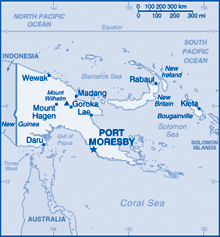 Constitution
ConstitutionThe Constitution declares the "underlying law" — that is, the separate common law of Papua New Guinea — to consist of the Constitution, "customary law" derived from the "custom" of the various peoples of Papua New Guinea, and the common law of England as it stood at the date of Papua New Guinea's independence on 16 September 1975. That is to say, decisions of the High Court of Australia, the Judicial Committee of the Imperial Privy Council, not being part of the common law of England, and indeed of the pre-independence courts of Papua New Guinea itself are not part of Papua New Guinea law; but decisions of the House of Lords, the English Court of Appeal, the English Queens Bench Division and other English courts up until Papua New Guinea's independence are. This reflected the fact that Papua New Guinea — at least, Papua, the former British New Guinea — was in law a British possession albeit administered by Australia as an External Territory.
The "customary law" portion of the "underlying law" was contemplated by the original framers of the Constitution as deriving from the regional customs of the country in the same way as the common law of England (that law which was "common" to the whole country) had done prior to 1189, deemed to be "time immemorial" in English law. In practice the courts have found great difficulty in applying traditional custom in a modern legal system and the development of the customary law according to indigenous Melanesian conceptions of justice and equity has been less thorough than may have been anticipated in 1975. In 2000 the National Parliament enacted the Underlying Law Act 2000 which purports to mandate greater attention by the courts to custom and the development of customary law as an important component of the underlying law. Thus far the statute appears not to have effected such a result.
"Underlying law"
Statute law is very largely adopted from overseas jurisdictions. For example, the Criminal Code is adopted from Queensland; the Rules of Court are those of New South Wales; the Matrimonial Causes Act is the extremely old English statute of 1857 which had been in force in the Australian States before the federal Divorce Act, 1964; the Companies Act ch 146 was substantially the English Companies Act, 1948; it was replaced by the Companies Act, 1997, adopted from New Zealand.
Statutes
The judicial system consists of village magistrates courts, district courts in urban centres presided over by stipendiary magistrates, the National Court which is the superior trial court and the Supreme Court which is functionally an appellate division of the National Court: it is not separately constituted, its Chief Justice is also the Chief Justice of the National Court and its bench consists of National Court judges sitting as an ad hoc appellate tribunal. The Supreme Court is the final court of appeal: an appeal lay from the pre-independence Supreme Court to the High Court of Australia (but not directly to the Privy Council); this was abolished at independence. The Supreme Court also has jurisdiction under the Constitution to give advisory opinions, called "references," on the constitutionality of legislation. In addition to its function as a trial court, the National Court also functions as a court of disputed returns hearing "Electoral Petitions" by unsuccessful candidates for Parliament; Leadership Tribunals hearing cases of alleged misconduct in office referred by the Ombudsman Commission consist of one National Court judge and two District Court magistrates.
The Supreme Court has a special responsibility for developing the "underlying law," ie the common law of Papua New Guinea, having resort to those rules of local custom in various regions of the country which may be taken to be common to the whole country. The responsibility has been given additional express warrant in the Underlying Law Act, 2000 which purports to mandate greater attention by the courts to custom and the development of customary law as an important component of the underlying law. In practice the courts have found great difficulty in applying the vastly differing custom of the many traditional societies of the country in a modern legal system and the development of the customary law according to indigenous Melanesian conceptions of justice and equity has been less thorough than may have been anticipated in 1975; the Underlying Law Act does not yet appear to have had significant effect.
Advocacy follows the conventions of the English common law world and is adversarial rather than inquisitorial; German law was wholly displaced by Anglo-Australian law in the former German New Guinea after 1914 when Australia seized the Territory and there are no traces of it in modern Papua New Guinea.
The current Chief Justice of Papua New Guinea is the Honourable Sir Mari Kapi.
The "Rooney Affair": An early crisis in relations between the executive and judiciary
Weisbrot, D., Paliwala, A. and Sawyerr, A. Law and Social Change in Papua New Guinea (Sydney, 1982)
No comments:
Post a Comment